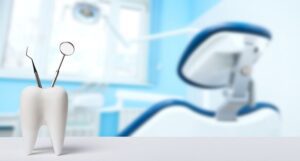Antibiotics are powerful medications that help fight the bacteria that cause infections. Dentists use antibiotics in two ways: 1) to treat infections happening now and 2) to stop infections from happening after a dental appointment.
They follow established guidelines to make sure antibiotics are used safely and effectively. This article talks about both scenarios and explains the most recent guidance based on the most up-to-date research.

Antibiotics for Active Infections
Sometimes, our teeth or gums develop bacterial infections. Antibiotics are often prescribed to help resolve the issue. But not all dental infections require antibiotics – in fact, quite few do. It is important to keep in mind that:
- Overprescribing antibiotics decreases their effectiveness, and certain antibiotics upset the normal bacterial harmony of our digestive systems.
- When we take oral antibiotics (pills or liquids), they do not work very well in targeting bacteria in the mouth.
- Antibiotics do not “solve” dental infections. They only help with pain and problems for a short time. Solutions to dental infections often include procedures like root canals, periodontal scaling, or tooth removal.
The American Dental Association released its most recent Clinical Practice Guidelines in 2019. Here is a summary:
- Dentists should not prescribe antibiotics to treat dental infections, regardless of pain or swelling. Instead, clinicians should consider pain relievers like acetaminophen and ibuprofen to manage discomfort.
- Rather than prescribe antibiotics, dentists should prioritize treating the dental issue causing the infection. Antibiotics should only be considered if a patient is considered “severely immunocompromised.”
- Only when a patient’s symptoms include fever or malaise should antibiotics be considered as part of treatment.
Antibiotics to Prevent Infections (Antibiotic Prophylaxis)
Historically, dentists routinely prescribed antibiotics to people with certain health issues prior to dental appointments – in particular, patients with certain heart conditions and patients with joint replacements. However, research has shown that this practice does not seem necessary or beneficial for most patients.
For instance, regarding antibiotics for patients with joint replacements or prosthetic joints, the guidelines explicitly state: “In general, for patients with prosthetic joint implants, prophylactic antibiotics are not recommended prior to dental procedures to prevent prosthetic joint infection.”
If patients are told by their orthopedic surgeon that they should have antibiotics despite the professional guidelines, the surgeon should both choose the antibiotic and write the prescription for the patient.
Also, the only patients with heart conditions for which antibiotics are explicitly recommended are:
- Prosthetic cardiac valve or prosthetic material used for cardiac valve repair
- Previous infective endocarditis
- Unrepaired cyanotic congenital heart disease (CHD)
- Completely repaired congenital heart defect with prosthetic material or device, only during the first six months after the procedure
- Repaired CHD with residual defects at the site or adjacent to the site of a prosthetic patch or prosthetic device (which inhibit endothelialization)
- Heart transplant recipients who develop cardiac valvulopathy
The takeaway is simple – very few patients require antibiotics in conjunction with routine hygiene or operative dental care.
